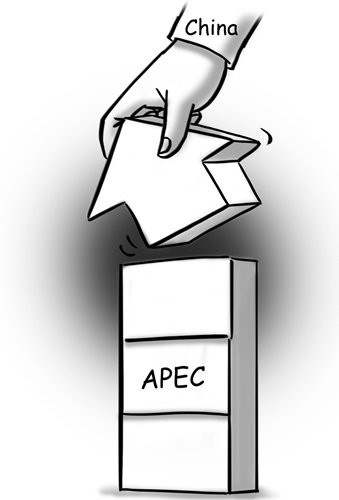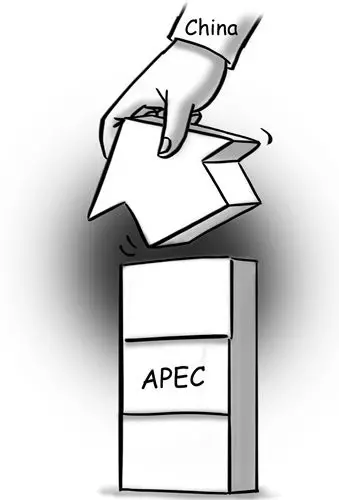By Yang Danzhi From Global Times/People`s Daily

Pic: Photo:Liu Rui/GT
Chinese President Xi Jinping delivered a keynote speech at the 25th Asia-Pacific Economic Cooperation (APEC) Economic Leaders' Meeting on Friday, making it his first international multilateral engagement since the 19th National Congress of the Communist Party of China.
Although Xi and US President Donald Trump just concluded their strategic dialogue in Beijing, and jointly laid the pitch for Sino-US cooperation, their speeches at the APEC meeting suggest that the countries have totally different visions of multilateralism and multilateral trade system.
In his speech, Trump showed suspicion of the current multilateral trade regime, and is apparently more inclined to bilateral economic cooperation by signing free trade agreements. As the world's largest economy, the US lacks interest and confidence to continue to promote and guide globalization.
According to Xi's speech, China is determined to participate in, integrate into and even guide economic globalization. Xi also put forward China's solutions to adapt to the profound changes in "growth drivers," "the model of global growth," "economic globalization" and "the system of global economic governance," and further promote world economy, especially that of the Asia-Pacific.
First, we should firmly support the multilateral trade regime, practice regionalism and build an open economy. We need to facilitate and liberalize trade and investment, make globalization more open, inclusive and balanced, and reshape the global VALUE chain. We should fully implement the Beijing Roadmap for building an Asia-Pacific free trade area.
Second, we need to attach more importance to forging mechanisms, including setting up a regional cooperation framework that ensures consultation among equals, wider participation and shared benefits, and building a comprehensive, multi-tiered Asia-Pacific connectivity network.
Third, we need to continue to pursue innovative and inclusive growth, implement the APEC Accord on Innovative Development, Economic Reform and Growth adopted in Beijing, deepen cooperation on the Internet and digital economy, and strive to be a global leader with innovative growth. We should make inclusiveness and sharing a part of our development strategies, improve systems and institutions to uphold efficiency and fair play.
In addition, Xi's speech suggests that China's reform and opening-up is closely linked with international economic development, and China will unwaveringly promote it. China's development includes politics, economy, society and people's livelihood, which will benefit not only its neighbors, but also the world. At present, Beijing's Belt and Road initiative will help enhance China's strategic cooperation with countries along the route, and eventually lead to mutual development and prosperity. The concepts of "a new type of international relations," "a community of shared future for mankind" and "Chinese dream" will be gradually recognized by the international community.
Top Chinese leaders have participated in every APEC leaders' informal meeting since the establishment of the organization. China is not only a participant in APEC, but has also become a contributor to the mechanism and an actual leader of its development. While some developed countries are increasingly hesitant in participating at multilateral mechanisms, China's commitments to APEC reflect its sense of responsibility as a major developing country.
Currently, the world economy is still under recovery. APEC is slowly developing amid trade protectionism. But globalization and regional economic integration are irreversible. China and other APEC members need to strengthen cooperation to adapt to and promote globalization and regional economic integration.
(The author is director assistant of the Center for Regional Security Studies, Chinese Academy of Social Sciences)
Although Xi and US President Donald Trump just concluded their strategic dialogue in Beijing, and jointly laid the pitch for Sino-US cooperation, their speeches at the APEC meeting suggest that the countries have totally different visions of multilateralism and multilateral trade system.
In his speech, Trump showed suspicion of the current multilateral trade regime, and is apparently more inclined to bilateral economic cooperation by signing free trade agreements. As the world's largest economy, the US lacks interest and confidence to continue to promote and guide globalization.
According to Xi's speech, China is determined to participate in, integrate into and even guide economic globalization. Xi also put forward China's solutions to adapt to the profound changes in "growth drivers," "the model of global growth," "economic globalization" and "the system of global economic governance," and further promote world economy, especially that of the Asia-Pacific.
First, we should firmly support the multilateral trade regime, practice regionalism and build an open economy. We need to facilitate and liberalize trade and investment, make globalization more open, inclusive and balanced, and reshape the global VALUE chain. We should fully implement the Beijing Roadmap for building an Asia-Pacific free trade area.
Second, we need to attach more importance to forging mechanisms, including setting up a regional cooperation framework that ensures consultation among equals, wider participation and shared benefits, and building a comprehensive, multi-tiered Asia-Pacific connectivity network.
Third, we need to continue to pursue innovative and inclusive growth, implement the APEC Accord on Innovative Development, Economic Reform and Growth adopted in Beijing, deepen cooperation on the Internet and digital economy, and strive to be a global leader with innovative growth. We should make inclusiveness and sharing a part of our development strategies, improve systems and institutions to uphold efficiency and fair play.
In addition, Xi's speech suggests that China's reform and opening-up is closely linked with international economic development, and China will unwaveringly promote it. China's development includes politics, economy, society and people's livelihood, which will benefit not only its neighbors, but also the world. At present, Beijing's Belt and Road initiative will help enhance China's strategic cooperation with countries along the route, and eventually lead to mutual development and prosperity. The concepts of "a new type of international relations," "a community of shared future for mankind" and "Chinese dream" will be gradually recognized by the international community.
Top Chinese leaders have participated in every APEC leaders' informal meeting since the establishment of the organization. China is not only a participant in APEC, but has also become a contributor to the mechanism and an actual leader of its development. While some developed countries are increasingly hesitant in participating at multilateral mechanisms, China's commitments to APEC reflect its sense of responsibility as a major developing country.
Currently, the world economy is still under recovery. APEC is slowly developing amid trade protectionism. But globalization and regional economic integration are irreversible. China and other APEC members need to strengthen cooperation to adapt to and promote globalization and regional economic integration.
(The author is director assistant of the Center for Regional Security Studies, Chinese Academy of Social Sciences)
 Menu
Menu
 China lays out multilateral vision at APEC
China lays out multilateral vision at APEC
















